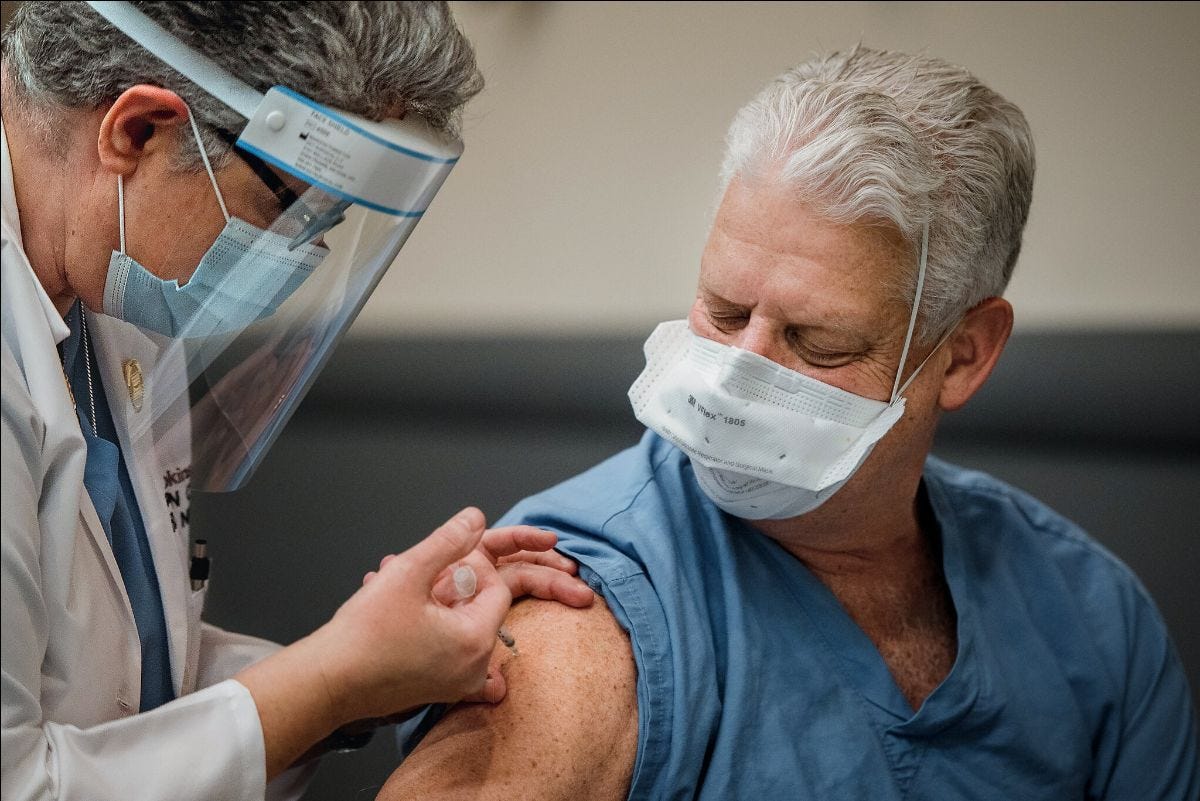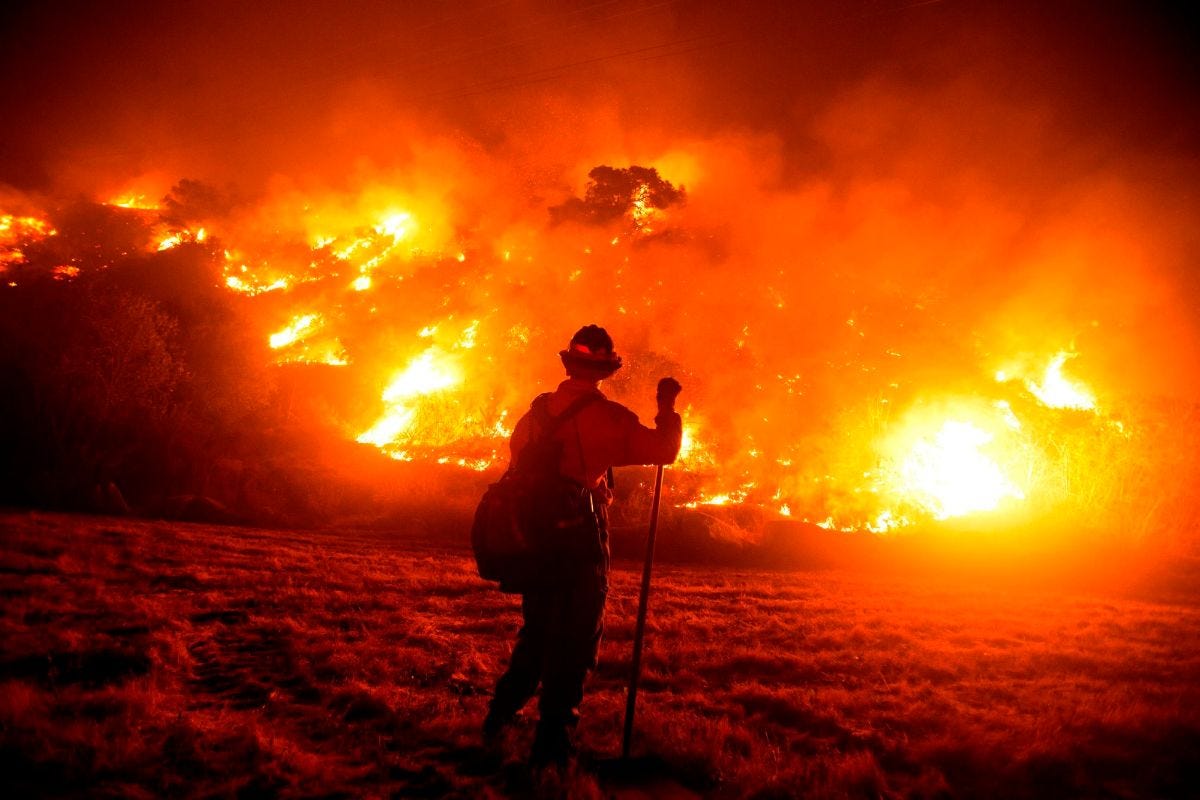Good morning! It’s Tuesday, July 20, 2021. Election Day 2022 is 476 days away. Election Day 2024 is 1,204 days away.
Biden’s six-month progress report
When Joe Biden accepted the Democratic presidential nomination in August of last year, he identified “four historic crises” facing the United States.
Today, as Biden’s presidency — and complete Democratic control of Congress — arrives at its six-month mark, I’m checking in on the progress he’s made in addressing those four crises, using the words he invoked to describe them last year.
“The worst pandemic in over 100 years”: Coronavirus cases have largely plummeted since Biden took office, with around 185,000 new cases recorded on January 20 and around 56,000 new cases recorded yesterday. In the same time span, vaccinations have skyrocketed: about 14 million Americans had received at least one vaccine dose on Inauguration Day. Today, more than 186 million Americans have, in part due to efforts by Biden to expand access to the shots.
However, while the broader state of the pandemic may look rosier than in January, the U.S. is far from out of the woods. As I wrote in Monday’s newsletter, new cases are now increasing in all 50 states, as the Delta variant spreads and vaccinations stagnate. Despite trying several strategies and incentives, Biden has had serious trouble convincing several groups to get vaccinated — young Americans and people in Republican-leaning, rural areas chief among them.
Until more people are vaccinated, cases and deaths of the virus will only continue to rise, as will the chances of a new variant emerging that can evade the vaccine and put immunized Americans at risk as well.
“The worst economic crisis since the Great Depression”: Biden boasted on Monday that more than 3 million new jobs had been created since he took office, which he said was “the fastest growth” of any president’s first six months. “We’ve gone from [adding] 60,000 jobs per month to 60,000 jobs every three days,” he said.
It’s true that 3 million more Americans are employed now than in January, although context is needed for Biden’s comparison to his predecessors. Biden entered office at a unique time: when there was historic unemployment, but only because of pandemic-era job losses that were projected to be temporary (and were already beginning to be recovered when he took office). That created conditions that allowed for a historic level of job growth over a short period of time.
Even with the jobs recovered, the economy is still about 6.8 million jobs away from returning to its pre-pandemic level, with some worried about
Biden’s enhanced unemployment benefits creating a labor shortage. Still, in his Monday speech, Biden emphasized the role that his $1.9 trillion stimulus package — his signature legislative accomplishment thus far, which also included $1,400 direct checks — had played in the recovery.
That package faces other critics, though: particularly economists on both sides of the aisle who have warned it will lead to inflation. Indeed, prices rose 5.4% in June compared to a year ago, the largest inflation spike since the 2008 recession. Biden dismissed the price increases as “temporary” on Monday, but White House officials are reportedly worrying in private that the issue might be more serious than they’ve admitted.
“The most compelling call for racial justice since the 60s”: With the Senate filibuster blocking most legislative action, Biden has struggled to make much progress on civil rights — frustrating activists who have urged him to call for the filibuster’s elimination.
Biden has delivered several major speeches focused on voting rights, in response to hundreds of Republican-backed voting restrictions that have been proposed across the country. But a Democratic attempt to undo some of those state-level bills was blocked in the Senate, and a Supreme Court decision during his term made it even harder to challenge such restrictions in court.
Most of the Biden administration’s actions on the civil rights front have come from the Justice Department, which has launched investigations into two police departments accused of racial bias and a lawsuit against Georgia over its voting law. In Congress, one accomplishment has been a bipartisan law addressing hate crimes against Asian-Americans; however, there is little path forward for voting rights legislation, and negotiations over police reform remain stalled.
“The undeniable realities and accelerating threats of climate change”: Extreme weather events tied to climate change have continued to cause devastation in recent weeks, from record-breaking temperatures and wildfires in the Western United States to deadly floods in Europe.
Biden has also picked up his climate advocacy lately, pushing for Congress to adopt the climate provisions in his American Jobs Plan and American Families Plan. Most of the climate action will be included in the $3.5 trillion reconciliation package Democrats are hoping to advance; proposals expected to end up in the bill include tax credits for clean energy and electric vehicles, a clean energy standard, and a “civilian climate corps.”
Biden has also taken some executive actions on climate change, including rejoining the Paris climate agreement and pledging to reduce U.S. greenhouse gas emissions by at least 50% by 2030. However, the fate of his climate agenda largely remains a question mark, as the Democratic spending package — and an accompanying bipartisan infrastructure deal — faces an uncertain future in Congress.
These are not the only issues facing the Biden presidency, of course. Migrants continue to flood into the United States, the U.S. withdrawal from Afghanistan is nearing, the list goes on and on.
But after six months of both success and setbacks, these four issues — the ones Biden himself prioritized when seeking the White House — offer a useful place to start in assessing the 46th president’s first half-year in office.
“History has delivered us to one of the most difficult moments America has faced,” Biden declared in August 2020 when laying out the “four historic crises.”
“So the question for us is simple: Are we ready? I believe we are,” he said then. “We must be.”
The Rundown
More stories driving the news this morning.
DOJ leak investigations. “Attorney General Merrick Garland has sharply limited how and when prosecutors can secretly obtain reporters’ phone and email records, formalizing a Biden administration decree that the government would stop using secret orders and subpoenas for journalists’ data to hunt for leakers.” Washington Post
Afghanistan withdrawal. “The Pentagon will use military bases in the U.S. and Qatar to house thousands of Afghan interpreters and translators, along with their families, part of a scramble to evacuate those who worked with the U.S. during the war and face retribution from the Taliban, according to officials.” Wall Street Journal
January 6 committee. “House Minority Leader Kevin McCarthy, R-Calif., has nominated five Republican representatives to serve on the House select committee to investigate the Jan. 6 Capitol insurrection. His list for the Democratic-led probe into the deadly melee includes three lawmakers who voted against certifying the 2020 presidential election results after the attack.” CNN

Policy Roundup: Education
On Tuesdays, Wake Up To Politics contributor Kirsten Shaw Mettler offers a roundup on the latest education news to know. Today, she’s zeroing in on a recent trend in higher education:
A number of Black professors have recently walked away from predominantly white colleges, citing racial bias. The University of North Carolina at Chapel Hill initially failed to offer Pulitzer Prize-winning journalist Nikole Hannah-Jones tenure after facing pressure from conservatives, unhappy with her “1619 Project” for The New York Times.
In wake of protests, UNC recalculated and offered the journalist tenure. But, Hannah-Jones flipped the script: she declined the revised offer and instead decided to teach at Howard University, a historically Black college (HBCU).
“It’s not my job to heal the University of North Carolina,” Hannah-Jones said. “That’s the job of the people in power who created the situation in the first place.”
Other academics have followed suit. Renowned Black scholar Cornel West accused Harvard University of “spiritual rot” in his public resignation letter last week, noting various examples of discrimination. At Stanford University, Jorge Caballero, known for his research on racism in health care, resigned on July 12. He claimed that the School of Medicine punished him for advocating on behalf of students of color.
Meanwhile, high-profiles hires and increased funding have given a spotlight to HBCUs. Such institutions have seen an uptick in enrollment since the broader racial justice reckoning last year, but many continue to face serious financial challenges.

More education policy headlines, via Kirsten:
A federal judge decided on Monday that Indiana University can require COVID-19 vaccines for its students, the first ruling in a lawsuit over whether universities can enforce such mandates.
21 Republican attorneys general have criticized the Biden administration’s interpretation of Title IX for including gender identity and sexual orientation protections.
The American Academy of Pediatrics announced new recommendations that all children over the age of 2 wear masks in school, regardless of vaccination status, contrary to the CDC’s guidance.
Daybook
What’s happening in Washington today. (All times Eastern)
Executive Branch
→ President Joe Biden will receive his daily intelligence briefing at 9:15 a.m. At 11:15 a.m., he will welcome the Tampa Bay Buccaneers to the White House to honor their Super Bowl win earlier this year. At 3:15 p.m., he will hold his first Cabinet meeting in the Cabinet Room, to mark six months in office. (A previous Cabinet meeting was held in the more spacious East Room to allow for social distancing.)
According to CNN, the Cabinet meeting is expected to focus on COVID-19, infrastructure, climate, and cybersecurity.
→ Vice President Kamala Harris hosted King Abdullah II of Jordan for a working breakfast at her official residence at 8:45 a.m. At 3:15 p.m., she will attend Biden’s Cabinet meeting.
→ White House Press Secretary Jen Psaki will hold her daily press briefing at 11:45 a.m.

Legislative Branch
→ The Senate will convene at 10 a.m. Following Leader remarks, the chamber will move to consider the nominations of Kenneth Polite to be Assistant Attorney General of the Criminal Divison and Jennifer Abruzzo to be General Counsel of the National Labor Relations Board.
At 11:30 a.m., the Senate will hold a cloture vote to advance Polite’s nomination, followed by a cloture vote on Abruzzo. The chamber will then recess until 2:15 p.m. to allow for weekly caucus meetings. At around 2:30 p.m., the Senate will vote to confirm Polite, who served as U.S. Attorney for the Eastern District of Louisiana during the Obama administration, if cloture was invoked earlier in the day,
The Senate is also expected to vote this afternoon on passage of H.R. 1652, a bipartisan bill to strengthen the Victims of Crime Act (VOCA) of 1984. The measure would direct funds generated by federal criminal settlements from non-prosecution and deferred prosecution agreements to the Crime Victims Fund (CVF), a fund providing assistance to victims of violent crimes that was set up by the 1984 law.
Hearing to watch:
The Senate Health, Education, Labor, and Pensions Committee will hold a hearing at 10 a.m. on the “path forward” for the COVID-19 response. Witnesses: CDC Director Rochelle Walensky, NIAID Director Anthony Fauci, Acting FDA Commissioner Janet Woodcock, and Assistant Secretary of Health and Human Services for Preparedness Dawn O’Connell.
→ The House will convene at 10 a.m. Following 30 one-minute speeches, the chamber will move to legislative business at 12 p.m.
The chamber is scheduled to vote on 13 pieces of legislation under “suspension of the rules,” a House process that allows bills to be fast-tracked if they are supported by two-thirds of the chamber:
H.R. 1870, the Strengthening Local Transportation Security Capabilities Act
H.R. 1893, the Transportation Security Preparedness Act
H.R. 1895, the Transportation Security Public Health Threat Preparedness Act
H.R. 1877, the Security Screening During COVID-19 Act
H.R. 1871, the Transportation Security Transparency Improvement Act
H.R. 2795, the DHS Blue Campaign Enhancement Act
H.R. 3138, the State and Local Cybersecurity Improvement Act
H.R. 1833, the DHS Industrial Control Systems Capabilities Enhancement Act
H.R. 2980, the Cybersecurity Vulnerability Remediation Act
H.R. 3223, the CISA Cyber Exercise Act
H.R. 3264, the Domains Critical to Homeland Security Act
H.R. 1850, the Supporting Research and Development for First Responders Act
H.R. 3263, the DHS Medical Countermeasures Act
The House will also consider H.R. 2668, the Consumer Protection and Recovery Act, and hold 11 additional “suspension” votes postponed from Monday:
H.R. 2928, the Cyber Sense Act
H.R. 1250, the Emergency Reporting Act
H.R. 1754, the MEDIA Diversity Act of 2021
H.Res. 277, a resolution “reaffirming the commitment to media diversity and pledging to work with media entities and diverse stakeholders to develop common ground solutions to eliminate barriers to media diversity”
H.R. 3003, the Promoting United States Wireless Leadership Act
H.R. 678, the PHONE Act
H.R. 1158, the Refugee Sanitation Facility Safety Act
H.Res. 294, a resolution “encouraging reunions of divided Korean-American families”
H.R. 2118, the Securing America From Epidemics Act
H.R. 1079, the Desert Locust Control Act
H.R. 1036, the Bassam Barabandi Rewards for Justice Act
Some of the “suspension” bills may be voted on as a bloc in a single vote, under a controversial rules change made by Democrats in April.
Judicial Branch
→ The Supreme Court is on recess until October.
Thanks for waking up to politics! If you enjoy reading this newsletter, I’d be so grateful if you’d consider donating to help support me and my work. If you want to show off your support for Wake Up To Politics, you can also buy some merchandise.
Also: don’t forget to tell your friends and family to sign up for the newsletter using your unique referral link. And if you have any questions or comments, feel free to email me at any time.










